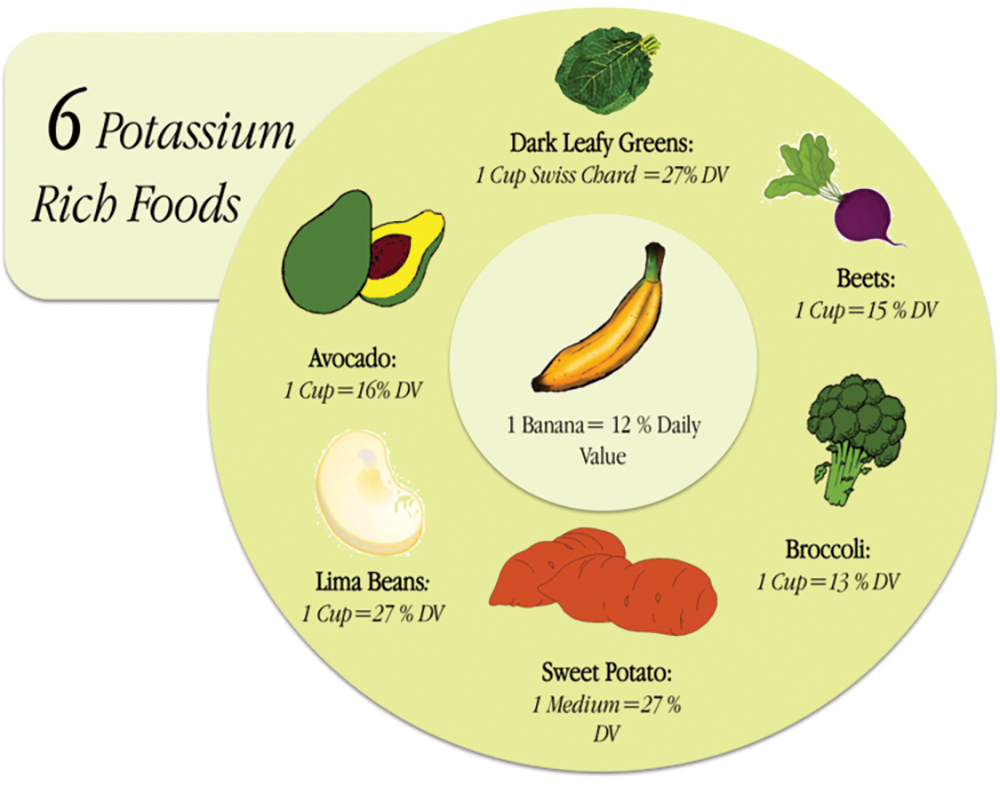
Recently, American Society of Nephrology has raised concern over low potassium intake in diet as an inciting factor for hypertension. In a large study, urine samples were evaluated for knowing potassium deficiency in body, and it was more strongly correlated than sodium to cause hypertension.
Potassium is also an important constituent of body fluid. It resides mostly inside red blood cells, muscles, tissue, nerves and brain. Its concentration is low in body fluids but is a very important determining factor of cardiac function, especially rhythm.
DASH (Dietary Approaches to Stop Hypertension) is another prominent study confirming the same effect. This study also linked low potassium intake to increased risk of stroke. Potassium is also necessary to prevent muscular cramps, maintain sugar levels and to maintain optimal fluid balance.
Potassium deficiency leads to hypertension because potassium lessens the effect of sodium. The more potassium you eat, the more sodium you lose through urine. Potassium also helps to ease tension in your blood vessel wall, which helps further lower blood pressure.
Potassium can be harmful in patients with kidney disease — any condition that affects how the body handles potassium or those who take certain medication. So the decision of whether to take excess potassium should be discussed with your doctor. Recommended potassium intake for an average adult is 4-4.5 gm per day. Fruits and vegetables are good natural sources of potassium.
But potassium is only one component of an all-round plan for blood pressure control, and with your effort to break up with that excess salt and develop other healthy eating and lifestyle habits to control your BP.
Fruits, citrus especially, bananas, leafy green vegetables, lemon, coconut water, kidney beans, lentils, zucchini, mushrooms, peas, apricot are potassium-rich foods. Even energy drinks, ORS solutions and intravenous fluids have balanced amount of potassium, showing relevance of the ion in the body.
Clearly, a healthy vegan diet would suffice for our daily requirement of potassium. But the balance is always delicate so medical supervision is necessary.
Kidney disease, muscular disease like dystrophies, diabetes and liver disease require special mention here. Hypertension may be a symptom in many of these diseases and potassium levels may already be raised in them. Increased potassium levels may even lead to sudden cardiac event. So be careful, it’s a double-edged sword.
Dr Dhir is Director & Head, Cardiac Surgery, Fortis Memorial Research Institute
Experts say stress, lifestyle habits and underlying medical conditions are driving ED in men under…
National Green Tribunal fined the Delhi Pollution Control Committee Rs 50,000 for over a year’s…
Delhi Zoo will receive a tiger, gharials, wolves and owls from Patna, while sending a…
Veteran actor Anil Kapoor reflects on four decades in cinema with gratitude as he takes…
Indian Youth Congress president held as police tighten security and invoke conspiracy and unlawful assembly…
Police said the Rajasthan native, undergoing depression treatment, jumped in front of a train at…